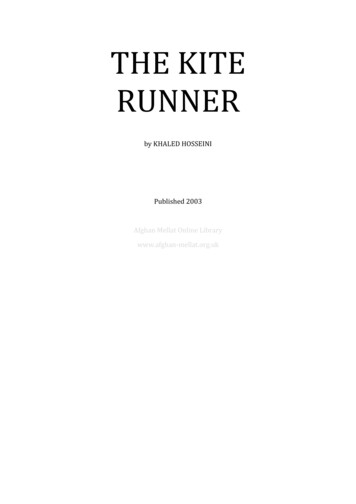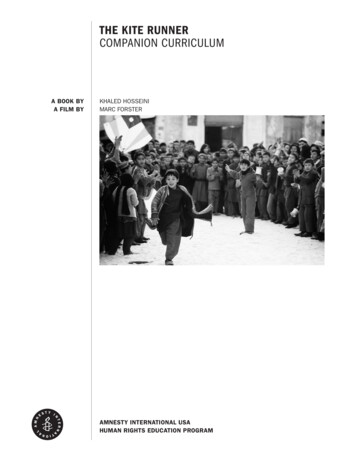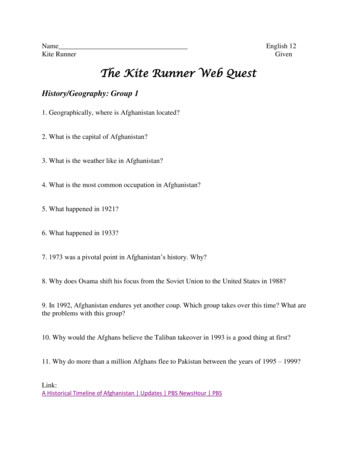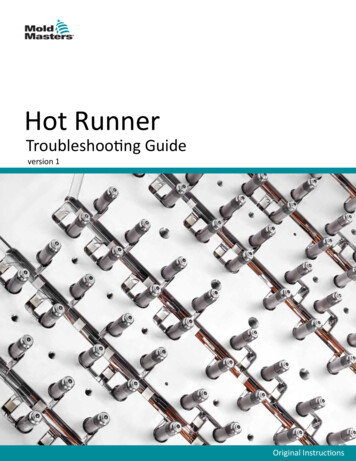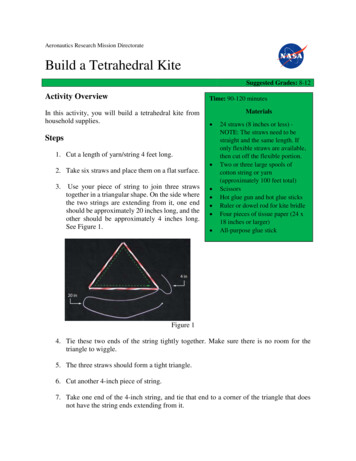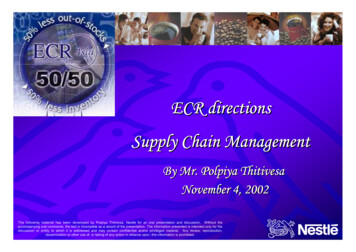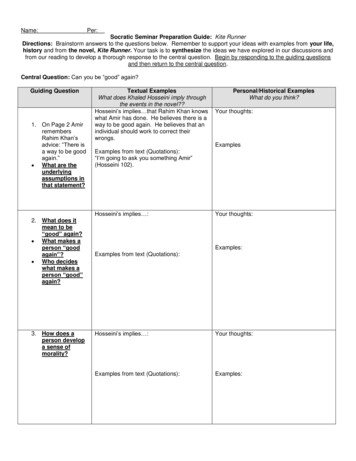
Transcription
Name:Per:Socratic Seminar Preparation Guide: Kite RunnerDirections: Brainstorm answers to the questions below. Remember to support your ideas with examples from your life,history and from the novel, Kite Runner. Your task is to synthesize the ideas we have explored in our discussions andfrom our reading to develop a thorough response to the central question. Begin by responding to the guiding questionsand then return to the central question.Central Question: Can you be “good” again?Guiding Question1. On Page 2 AmirremembersRahim Khan’sadvice: “There isa way to be goodagain.” What are theunderlyingassumptions inthat statement?Textual ExamplesWhat does Khaled Hosseini imply throughthe events in the novel?Hosseini’s implies that Rahim Khan knowswhat Amir has done. He believes there is away to be good again. He believes that anindividual should work to correct theirwrongs.3. How does aperson developa sense ofmorality?Your thoughts:ExamplesExamples from text (Quotations):“I’m going to ask you something Amir”(Hosseini 102).Hosseini’s implies :2. What does itmean to be“good” again? What makes aperson “goodagain”? Who decideswhat makes aperson “good”again?Personal/Historical ExamplesWhat do you think?Your thoughts:Examples:Examples from text (Quotations):Hosseini’s implies :Your thoughts:Examples from text (Quotations):Examples:
4. Rahim Khansays: “And I’ll tellyou this Amir, jan:In the end, theworld alwayswins. What’s justthe way ofthings.” What does theworld ‘winning’look like? Does the worldalways “win”?Hosseini’s implies :Your thoughts:Examples from text (Quotations):Examples:Socratic Seminar: Participant RubricA Level Participant Participant offers enough solid analysis, without prompting, to move the conversation forward Participant, through her comments, demonstrates a deep knowledge of the text and the question Participant has come to the seminar prepared, with notes and a marked/annotated text Participant, through her comments, shows that she is actively listening to other participants Participant offers clarification and/or follow-up that extends the conversation Participant’s remarks often refer back to specific parts of the text.B Level Participant Participant offers solid analysis without prompting Through comments, participant demonstrates a good knowledge of the text and the question Participant has come to the seminar prepared, with notes and a marked/annotated text Participant shows that he/she is actively listening to others and offers clarification and/or follow-up Participant makes at least one reference back to the text.C Level Participant Participant offers some analysis, but needs prompting from the seminar leaderThrough comments, participant demonstrates a general knowledge of the text and questionParticipant is less prepared, with few notes and no marked/annotated textParticipant is actively listening to others, but does not offer clarification and/or follow-up to others’ commentsParticipant relies more upon his or her opinion, and less on the text to drive her commentsD or F Level Participant Participant offers little commentary Participant ignores the discussion and its participantsParticipant comes to the seminar ill-prepared with little understanding of the text and questionParticipant does not listen to others, offers no commentary to further the discussionParticipant distracts the group by interrupting other speakers or by offering off topic questions and comments
Guiding Question1. What is true courage?2. Why are certaingroups/ peoplemockingbirds?(innocents who arescapegoated)3. Why is losinginnocence animportant part oflife? (Coming ofage)4. What defines a “good”family?Textual ExamplesWhat does Harper Lee think?Lee’s opinion:Personal/Historical ExamplesWhat do you think?Your thoughts:Examples:Examples:Lee’s opinion:Your thoughts:Examples:Examples:Lee’s opinion:Your thoughts:Examples:Examples:Lee’s opinion:Your thoughts:
5. Why can stereotypesbe harmful?Examples:Examples:Lee’s opinion:Your thoughts:ExamplesExamples:6. What kinds ofstereotypes are therein society?Your thoughts:Lee’s opinion:Examples:Examples:Socratic Seminar Preparation Guide: Essay TopicsTo Kill a MockingbirdName:Per:Directions: Brainstorm answers to the questions below. Remember to support your ideas with examples from your life,history and from the novel, To Kill a Mockingbird. Your task is to synthesize the ideas we have explored in our
discussions and from our reading to develop a thorough response to the central question. Begin by responding to theguiding questions and then return to the central question.Central Question: What is true courage?Guiding Question7. What isprejudice?8. How is discriminationdifferent fromprejudice?9. What is racism?Textual ExamplesWhat does Harper Lee think?Lee’s opinion:Personal/Historical ExamplesWhat do you think?Your thoughts:Examples:Examples:Lee’s opinion:Your thoughts:Examples:Examples:Lee’s opinion:Your thoughts:Examples:Examples:
Guiding QuestionTextual ExamplesWhat does Harper Lee think?Lee’s opinion:Personal/Historical ExamplesWhat do you think?Your thoughts:Examples:Examples:Lee’s opinion:Your thoughts:Examples:Examples:12. Why are some peopleapathetic(unconcerned /reluctant) aboutending prejudice,discrimination, andracism? What givessome people hope?Lee’s opinion:Your thoughts:Examples:Examples:13. How can we fosterunity amongst diversegroups of people?Lee’s opinion:Your thoughts:Examples:Examples:10. What is institutionalracism?11. Why are certaingroups scapegoated?
Name: Per: Socratic Seminar Preparation Guide: Kite Runner Directions: Brainstorm answers to the questions below.Remember to support your ideas with examples from your life, history and from the novel, Kite Runner.Your task is to synthesize the ideas we have explored in our discussions and from our readin

